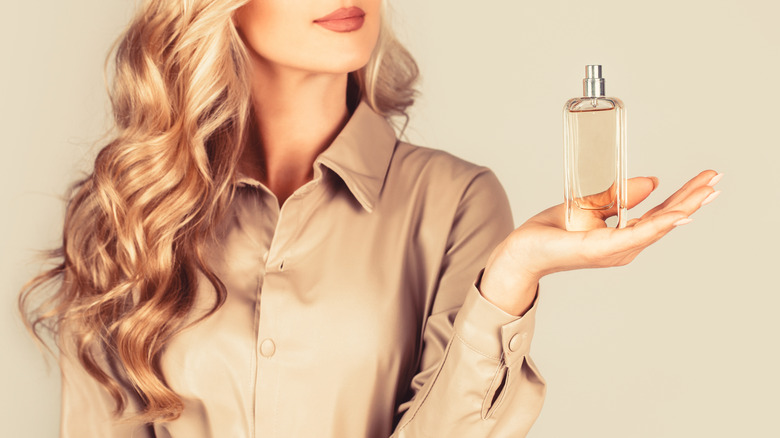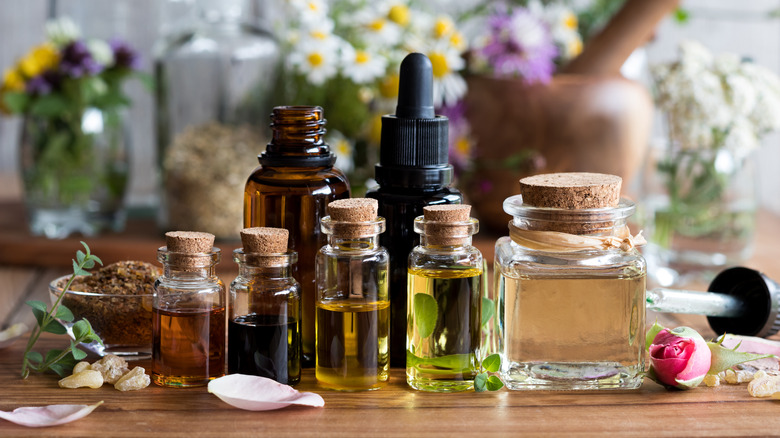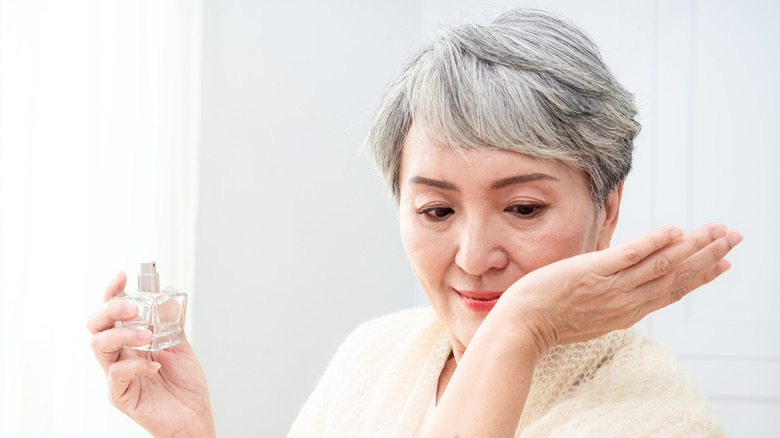Natural Vs. Synthetic Perfume: Which Is Right For You?
One of life's simple pleasures is perfume. There's something wonderful about having a signature scent. Scents are impactful in more ways than we realize. For example, it's known that smells can trigger memories and, for a millisecond, were transported back in time. Believe it or not, there's a right and wrong way to apply perfume — don't rub it in, and be sure to touch it up once a day to make it last longer. Likewise, there are spots you shouldn't bother applying perfume to, including your hair or facial skin.
With this in mind, there are two categories of perfumes — natural and synthetic. Natural fragrances are made with raw materials, such as plants, essential oils, and flowers. These are produced through cold pressing, dehydration, steam distillation, and other methods. On the other hand, synthetic fragrances either chemically extract the scent from a natural source or are made in a lab.
In many cases, natural and synthetic ingredients are used to formulate perfume and other scented products. However, the clean beauty craze has consumers contemplating what they spray on their bodies, which begs the question — should you choose a natural or synthetic perfume?
Natural doesn't necessarily mean safer
While synthetic perfumes have been produced since the 1800s, they have recently come under fire for their various adverse health effects. Synthetic perfumes are created with petrochemicals, which are known to cause hormonal imbalances, amongst other issues. Moreover, some synthetic perfumes contain carcinogens like formaldehyde — but are natural perfumes the preferred choice if you have health concerns? Not necessarily. Experts note that natural perfumes can trigger a slew of allergic reactions. Raw materials like jasmine, ylang-ylang, and rose essence are notorious for their allergy-inducing properties in perfumes. In addition, research published by the Endocrine Society suggested that lavender and tea tree oil may cause hormonal issues.
Natural perfumes are often costly and not as long-lasting as synthetic perfumes. "While raw materials are beautiful and complex, they can in fact smell completely different from what the consumer expects, because once they are in a form that can be used in perfumery, they don't smell like 'nature,'" olfactive expert Dawn Goldworm told The Zoe Report
Another con to keep in mind is due to the array of ingredients that need to be collected to create the perfume, natural perfumes are not always environmentally friendly. However, natural perfume brands will likely be more transparent regarding their ingredients than synthetic perfume, as this is their main selling point.
Synthetic perfume has a bad reputation
Despite being made in a lab, synthetic perfume is not as bad as we might think it is. In fact, they are less likely to cause unpleasant side effects. "By using safe synthetics, we are able to eliminate most common allergens that would have naturally been present in aromatic oils extracted from botanical/plant sources," Debi Theis, president of the fragrance brand Henry Rose, told The Zoe Report. Moreover, there is an assortment of natural scents that cannot be derived from natural ingredients, making synthetic perfumes essential.
Some experts, like perfumer David Moltz, believe natural and synthetic ingredients work best together. "Naturals are wonderful," Moltz told The Zoe Report. "They [act] as the main players in most fragrances, but without synthetics they mostly become a mass of conflicting ideas. The blend of naturals and synthetics is what makes a perfume sing."
Of course, choosing a natural or a synthetic perfume depends on your wants and needs. If you're looking for a long-lasting scent and are on a budget, synthetic perfume might be a better option. If knowing the ingredients of your perfume is essential to you and you don't mind the high cost, then a natural perfume is the way to go. Are you worried about allergies? Natural or not, sample a perfume before you purchase it.


